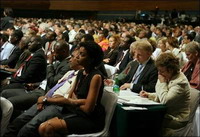European nations threaten to boycott US-sponsored climate talks
U.S.-sponsored climate talks next month may be boycotted by EU unless the Bush administration agrees to a "roadmap" for reducing green houses gases blamed for global warming.

As the Bali climate conference headed into the final hours, U.S. Nobel laureate Al Gore said the U.S. was "principally responsible" for blocking progress toward agreement on launching negotiations to replace the Kyoto Protocol when it expires in 2012. But he urged delegates to reach the required unanimous agreement even if it meant putting aside goals for emissions cuts.
"You can do one of two things here," he said. "You can feel anger and frustration and direct it at the United States of America, or you can make a second choice. You can decide to move forward and do all of the difficult work that needs to be done."
The United States, Japan, Russia and several other governments are refusing to accept language in a draft document suggesting that rich nations consider cutting emissions by 25 percent to 40 percent by 2020, saying specific targets would limit the scope of future talks.
European nations and others argue that numerical goals are essential reference points.
U.N. climate chief Yvo de Boer said the talks were in danger of "falling to pieces." He added that while he would like to see numbers in the final text, their omission would not constitute a failure.
The main goal in Bali is to kickstart two years of intense dialogue about how to slow global warming and head off scientific predictions of rising sea levels, worsening floods and droughts, and the extinction of some 30 percent of plant and animal species.
"If the numbers remain in there, then we achieved more than I expected," de Boer said.
Gore criticized the United States for being "principally responsible for obstructing progress" in Bali, raising loud cheers from conference delegates. But he also urged them to reach an agreement, which he said a future U.S. administration would likely support.
"Over the next two years, the United States is going to be somewhere it is not now," said Gore, fresh from receiving this year's Nobel Peace Prize for helping alert the world to the danger of rising temperatures.
He noted that all Democratic and several Republican presidential candidates support mandatory emissions cuts.
"I must tell you candidly that I can not promise that the person who is elected will have the position I expect they will have, but I can tell you I believe it is quite likely."
Kristen Hellmer, a member of the American delegation in Bali, said Gore's assertions were untrue.
"The U.S. is being open and working very constructively with the other countries that are here," she said. "We are rolling our sleeves up and really working to come up with a global post-2012 framework."
All sides agree that it is impossible to fight climate change without getting the United States onboard. It is the world's largest polluter and the only major industrial country that did not ratify Kyoto.
But U.S. President George W. Bush views his Major Economies Meeting as the main vehicle for determining future climate change action by the U.S.
The U.S. invited 16 major economies, including European countries, Japan, China and India, to discuss a program of what are expected to be nationally determined, voluntary cutbacks in greenhouse gas emissions, in Honolulu on Jan. 30-31.
"No result in Bali means no Major Economies Meeting," said Sigmar Gabriel, top EU environment official from Germany. "This is the clear position of the EU. I do not know what we should talk about if there is no target."
De Boer, the U.N. climate chief, said he was worried the U.S.-EU deadlock could derail talks that are scheduled to end Friday.
"I'm very concerned about the pace of things," he said. "If we don't get wording on the future, then the whole house of cards falls to pieces."
The United States delegation said while it continues to reject inclusion of specific emission cut targets, it hopes eventually to reach an agreement that is "environmentally effective" and "economically sustainable."
"We don't have to resolve all these issues ... here in Bali," said U.S. Under Secretary of State Paula Dobriansky, the head of the American delegation.
The Kyoto Protocol requires 37 industrial nations to reduce greenhouse-gas emissions by a relatively modest average 5 percent below 1990 levels by 2012. Australia was the latest country to ratify the pact, soon after Prime Minister Kevin Rudd was elected.
Bush has argued that the pact would harm the U.S. economy and cutbacks should have been imposed on poorer but fast-developing nations such as China and India, whose emission levels are growing fast.
China and India have called on the West to take the lead in cutting emissions and insisted they would not agree to any targets that would slow the pace of development. But neither has publicly said whether they would support the goals for emission targets in the Bali agreement.
Gore stole the show on Thursday when he addressed delegates in a packed conference hall, challenging them to forge an agreement with an eye on history.
Generations from now, actions taken in Bali would either raise questions of "what were you thinking? Didn't you pay attention to what was going on, didn't you care?" he said. Or, they will be held up as an example of moral courage against what seemed like insurmountable obstacles.
"Instead of shaking our heads at the difficulty of this path and saying this is impossible how can we do this, we ought to feel a sense of joy that we have work that is worth doing that is so important to the future of human kind," he said.
"You have everything that you need, we have everything we need except political will. But political will is a renewable resource."
Subscribe to Pravda.Ru Telegram channel, Facebook, RSS!


